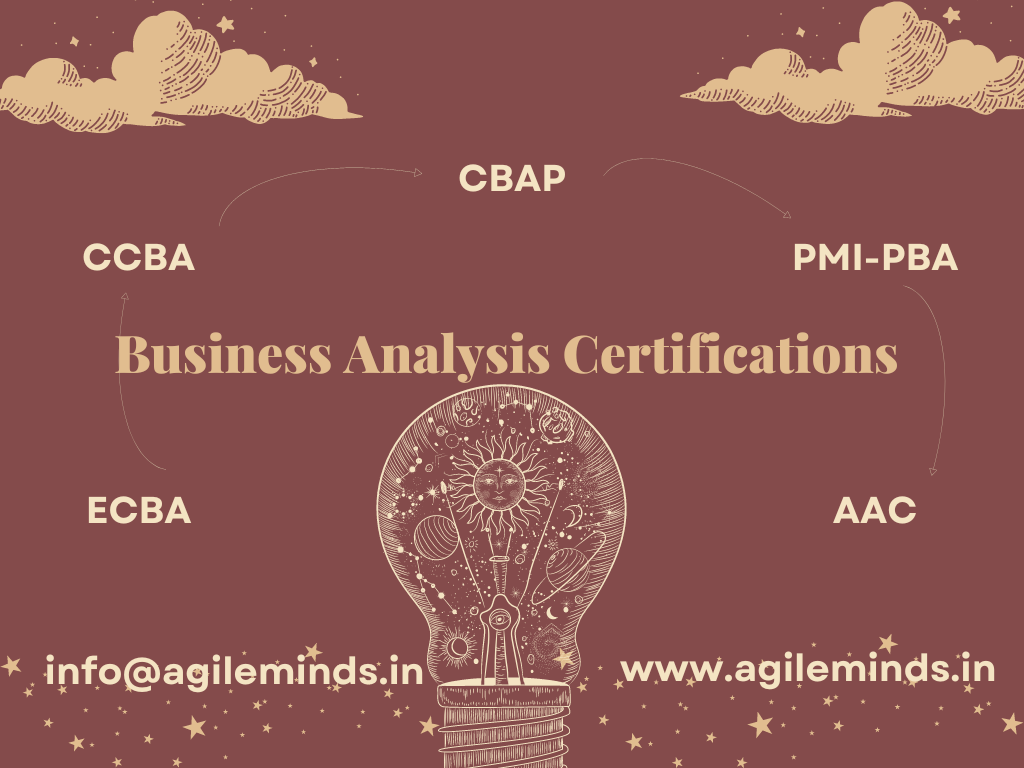Let’s discuss to become a business analyst which are the certifications in demand and useful. In today’s fast-paced and ever-evolving business landscape, organizations rely on skilled professionals to analyze complex data, bridge communication gaps, and drive strategic decision-making. Business analysts play a pivotal role in understanding business needs, identifying opportunities for improvement, and implementing effective solutions. Aspiring business analysts looking to enhance their credentials and stand out in the competitive job market can pursue various certifications. In this blog post, we will explore some of the prominent certifications available for individuals aspiring to become business analysts.

Certified Business Analysis Professional (CBAP):
The Certified Business Analysis Professional (CBAP) certification, offered by the International Institute of Business Analysis (IIBA), is widely recognized as a premier certification for business analysts. CBAP validates an individual’s expertise in business analysis by assessing their knowledge, experience, and skills. To be eligible for the CBAP certification, candidates must possess a minimum of 7,500 hours of business analysis work experience, along with 35 hours of professional development in the past four years. Link for the course
Certification of Competency in Business Analysis (CCBA):
The Certification of Competency in Business Analysis (CCBA) is another valuable certification provided by the IIBA. CCBA is designed for business analysts with less experience compared to CBAP. Candidates for CCBA must have at least 3,750 hours of business analysis work experience and 21 hours of professional development in the past four years. This certification demonstrates a solid foundation in business analysis principles and practices. Link for the course
Entry Certificate in Business Analysis (ECBA):
If you are new to the field of business analysis, the Entry Certificate in Business Analysis (ECBA) is an ideal starting point. Also offered by the IIBA, ECBA does not have any work experience requirements. However, candidates must complete 21 hours of professional development, which can be obtained through training, workshops, or educational programs. ECBA certification provides a fundamental understanding of business analysis terminology, principles, and practices. Link for the course
PMI Professional in Business Analysis (PMI-PBA):
The Project Management Institute (PMI) offers the PMI Professional in Business Analysis (PMI-PBA) certification, which focuses on business analysis within the context of project management. This certification demonstrates an individual’s proficiency in bridging the gap between business needs and project outcomes. To be eligible for PMI-PBA, candidates must possess a minimum of 4,500 hours of business analysis work experience (or 7,500 hours without a bachelor’s degree) and 35 hours of professional development. Link for the Course
Agile Analysis Certification (AAC):
In today’s dynamic business environment, Agile methodologies are widely adopted for project execution. The Agile Analysis Certification (AAC) provided by the IIBA caters specifically to business analysts working in Agile environments. The AAC certification recognizes an individual’s ability to apply business analysis practices and techniques within Agile frameworks. Candidates must demonstrate Agile-specific experience, such as working on Agile projects or completing Agile-related professional development. Link for the course
Conclusion:
Obtaining a recognized certification can significantly boost your career prospects as a business analyst. The certifications mentioned above, such as CBAP, CCBA, ECBA, PMI-PBA, and AAC, validate your expertise, enhance your credibility, and open doors to exciting opportunities in various industries. Each certification has specific eligibility requirements based on work experience, professional development hours, and domain knowledge.
It’s important to assess your qualifications and goals to choose the certification that aligns with your career aspirations. Remember, certifications are not only a means of showcasing your skills but also an opportunity for continuous learning and growth. So, explore the available certifications, invest in professional development, and embark on a rewarding journey towards becoming a proficient business analyst.
